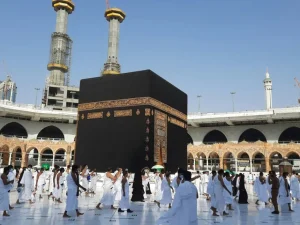THE JOURNEY OF A LIFETIME: HOW HAJJ TRANSFORMS THE HEART FOREVER

Hajj the fifth pillar of Islam is not merely a physical act of worship; it is a deeply spiritual journey that reshapes a believer’s soul, vision, and relationship with Allah. It is called the journey of a lifetime for a reason because it awakens the heart, humbles the ego, and renews the faith of those who embark on it.
Every Muslim who sets out for Hajj leaves behind the familiar comforts of home and enters a realm of divine reflection. It is a journey that takes one from the temporary to the eternal, from self to submission, and from worldly concerns to divine remembrance.
THE CALL OF HAJJ: ANSWERING ALLAH’S INVITATION
Not everyone who wishes to perform Hajj is able to go and that in itself is a reminder that Hajj is not a vacation but an invitation from Allah. The moment one receives the opportunity, they are answering a divine call that has echoed since the time of Prophet Ibrahim (AS), when Allah commanded him:
“And proclaim to the people the Hajj; they will come to you on foot and on every lean camel; they will come from every distant pass.” (Qur’an 22:27)
The very act of responding of saying “Labbayk Allahumma labbayk” (“Here I am, O Allah, here I am”) is a believer’s declaration of surrender and love. It is as though the pilgrim is saying, “I have left everything behind, O Allah, to answer Your call.”
THE IHRAM: A GARMENT OF EQUALITY AND HUMILITY
When the pilgrim puts on the ihram, they symbolically strip away all markers of status, wealth, and identity. The two simple white garments reflect the purity of the soul and remind the believer of the shroud they will one day wear in death.
In that moment, all worldly differences vanish. Kings and servants, rich and poor, young and old all stand shoulder to shoulder, united in one purpose: to worship Allah alone. The ihram teaches humility and equality, reminding us that in the sight of Allah, “The most noble of you in the sight of Allah is the most righteous of you.” (Qur’an 49:13)
TAWAF: CENTERING YOUR LIFE AROUND ALLAH
As the pilgrims circle the Ka‘bah in tawaf, their movement is symbolic of the believer’s life revolving around Allah, the center of existence. Every step around the sacred House is a renewal of faith, a reminder that our hearts, too, must revolve around the remembrance of Allah.
When millions of voices rise together in “Labbayk Allahumma labbayk”, the heart feels the weight of eternity. Each turn represents letting go of sins, of pride, of distractions and realigning the soul with the One who created it.
ARAFAH: THE DAY OF MERCY AND FORGIVENESS
Then comes the pinnacle of Hajj the Day of Arafah. On this day, millions stand together on the plains of Arafah, weeping, repenting, and begging for mercy. It is a scene that mirrors the Day of Judgment where every soul stands before its Creator, stripped of all titles and possessions.
The Prophet ﷺ said, “There is no day on which Allah frees more people from the Fire than the Day of Arafah.” (Muslim)
Arafah is not only a place of forgiveness but of rebirth. It is where hearts soften, egos crumble, and faith is renewed. It is the moment when a believer feels closest to Allah when the world fades and only His mercy remains.
STONING THE JAMARAT: DEFEATING THE INNER SHAYTAN
The stoning of the Jamarat where pilgrims throw pebbles at three pillars representing Shaytan is more than a ritual. It is a symbolic act of defiance against sin and temptation. Each stone represents a rejection of arrogance, greed, envy, lust, and every whisper of evil that tries to distance us from Allah.
It teaches the believer to carry this fight beyond Hajj to continuously resist the whisperings of Shaytan in daily life, and to stay firm in the path of righteousness.
RETURNING HOME: A NEW BEGINNING
When the pilgrim returns from Hajj, they return as though reborn. The Prophet ﷺ said, “Whoever performs Hajj and does not commit any obscenity or wrongdoing, returns as pure as the day his mother gave birth to him.” (Bukhari & Muslim)
The journey leaves a lasting imprint on the heart a renewed sense of humility, gratitude, and peace. Hajj teaches patience in difficulty, unity in diversity, and love for Allah above all else.
But the true test begins after the pilgrimage to live with the same purity, submission, and devotion that one felt in the sacred lands. Hajj changes the heart not just for a few days, but for a lifetime if the pilgrim carries its lessons home.
CONCLUSION
Hajj is more than an obligation; it is a sacred awakening. It strips away the illusions of this world and reminds the believer of their ultimate destination the return to Allah. It is a journey of tears, sacrifice, and rebirth.
For those who have gone, Hajj becomes a turning point a memory that echoes with every prayer and every breath. For those yet to go, it is a longing a call from Allah that one day will be answered.
Indeed, Hajj is the journey of a lifetime not because it takes you to Makkah, but because it brings your heart back to Allah.

